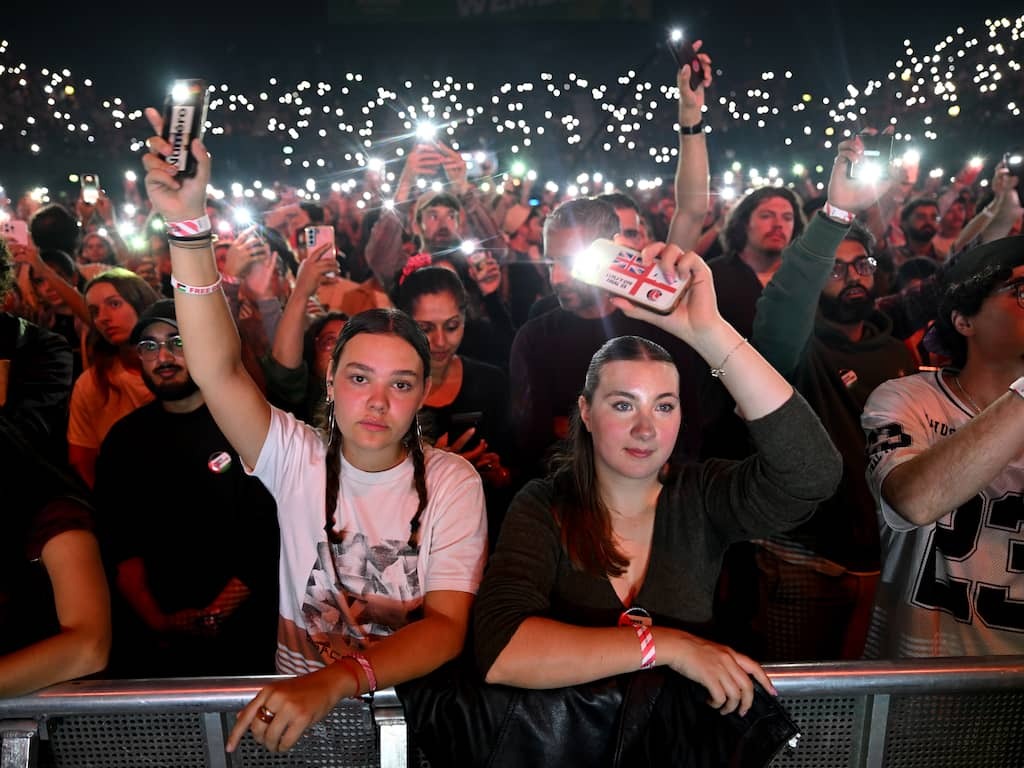
Fierce support from artists to Palestinians has made the news several times in recent weeks. An increasingly articulate audience expects artists to comment on social and political themes. But music and protest have been connected to each other for years.
“Many artists were afraid of saying the wrong one, but now realizing that silence is also a statement,” artist Pinkpantheress tells The Guardian about the increasing support for the Palestinians among musicians. “Artists are increasingly seeing that their platform matters and that it is their responsibility to fight justice. Neutrality should no longer be an option.”
Pink Pantheress spoke last week during the Together for Palestine concert in Wembley, where many British artists performed. It is one of the many actions in which artists show their voice, after statements at British festivals such as Glastonbury, but also at Lowlands and Down the Rabbit Hole in the Netherlands.
“There has always been a protest in pop music,” says university teacher Maryn Wilkinson (media and culture) of the University of Amsterdam. “Bob Dylan and The Beatles spoke out against the Vietnam War in the 1960s and 1970s. In the 1980s and 1990s, Madonna was an important voice that gave victims of the Aid crisis visibility.”
“It has always been that fans expect artists to express themselves, because the mutual band feels strong,” explains professor Pauwke Berkers (Sociology of Popular Music) of Erasmus University Rotterdam. “The big difference with the past is that thanks to social media, fans now have a way to address artists immediately.”
“Artists create the illusion of a personal conversation with their fans on social media with an insight into their private life,” says Wilkinson. “That ensures that the public wants to know how they think about certain things.”
‘Gen Z is focused on social equality’
The wish of pop artists to hear what they think of political matters is great among people from the so -called generation Z, who is now 13 to 28 years old. That generation is described by the Canadian sociologist Michele Lamont in her book Seeing Others on the basis of research as activist and focused on social equality. She investigated the lack of recognition and representation of marginalized groups and the younger generations deal with it.
Berkers sees that young people and young adults from today are more skilled in the sociological field. “As a Taylor Swift, you will no longer get away with minorities among your various audience, but not to express yourself for them. Having power and not using it, is not appreciated.”
Wilkinson emphasizes that Gen Z grows up in a time of strong polarization. “That is why it is extra important for them to know where their idol is. The idea: let me know where you stand so that I know where I am.”
‘Always large PR machine with a large artist’
According to Wilkinson, the popular artist who speaks out about everything without borders is an illusion. She investigated the political expressions of Taylor Swift in her documentary Miss Americana (2020). “There is still a huge PR machine around such an artist. In Taylor’s documentary you see that her team is very worried if she wants to express herself for a democratic candidate in Tennessee. She is the one who decides to do it anyway. But that is of course also what she and her team want to show.”
Although Swift, Lady Gaga and Beyoncé speak about their political preference, you don’t hear them about the situation in Gaza. Apart from large pop stars, exceptions such as Chappell Roan and Ariana Grande, do not soon speak out. “Encouraging people to vote or pronounce for marriage for people of the same sex and for the environment: that is now less controversial. But the situation in Gaza, certainly in the United States, causes strong discussions. Many artists do not venture there.”
‘Statements are cut out by politicians’
Artists such as the members of the Irish hip -hop group Kneecap and the English punk band Bob Vylan, who have a less mainstream audience, regularly come in the news due to fierce statements to, for example, the Israeli army. According to Berkers, those kinds of expressions are not unusual within the subculture.
“In the time that George W. Bush was President of the United States, you also saw buttons with his head as Adolf Hitler in the punk movement. In the past, those expressions remained within the subcultural context, but now everything is filmed and shared on social media. This is how a audience is not part of that subculture.”
According to Berkers, these statements are increasingly being “magnified and cut out” for political purposes. “The controversy or moral panic often only starts when a politician picks up a certain statement. You also saw that at Douwe Bob. The fact that he did not want to perform at a Jewish football club could have been resolved with a conversation between him and the organization. But it became national news because VVD leader Dilan Yesilgöz made a political statement of it.”
According to Berkers, pop music always crashes against politics. “Bob Vylan, who pulls full halls with Palestinian flags here, shows that a group of Dutch people are opposed to the prevailing politics through music.”
Fierce Support from Artists for Palestinians Has Repeatedly Made the News in recent weeks. An Increasingly Vocal Audience Expects Artists to Speak Out on Social and Political Themes. But Music and Protest Have Been Linked for Years.
“Many artists were afraid to say the wrong thing, but now realize that silence is also a statement,” artist pinkpantheress toed the guardian about the Increasing Support for Palestinians Among Musicians. “Artists Increasingly See that Their Platform Matters And That It is Their Responsibility to Fight for Justice. Neutrality Should No Longer Be An Option.”
Pink Pantheress Spoke Last Week at the Together for Palestine Concert in Wembley, where many British Artists Performed. It is one of many actions in which artists are making Their Voices Heard, after statements at British festivals Such as Glastonbury, But also at Lowlands and Down the Rabbit Hole in the Netherlands.
“Protest Has Always Been present in Pop Music,” Says University Lecturer Maryn Wilkinson (Media and Culture) from the University of Amsterdam. “Bob Dylan and the Beatles, For Example, Spoke Out Against the Vietnam War in the 1960s and 1970s. In the 1980s and 1990s, Madonna was an important Voice that cool visibility to Victims of the Aids Crisis.”
“It has always leg the case that fans expect artists to speak out because the mutual bond Feels Strong,” Explains professor Pauwke Berkers (Sociology of Popular Music) from Erasmus University Rotterdam. “The Big Difference from the Past is that fans now have a way to direct address artists thanks to social media.”
“Artists create the illusion of a personal conversation with their fans on social media with an insight into their private lives,” Says Wilkinson. “That Ensures that the public sug to know what they think about Certain Matters.”
‘Gen Z is Focused on Social Equality’
The Desire for Pop Artists to Be Heard on What they think about Political Matters is Great Among People of the So-Called Generation Z, Who Are Now 13 to 28 Years Old. That generation is described by Canadian sociologist Michele Lamont in the book Seeing Others on the Basis of Research as Activist and Focused on Social Equality. She Conducted Research Into the Lack of Recognition and Representation of Marginalized Groups and How Younger Generations Deal with this.
Berkers Sees That Young People and Young Adults Are Now More Knowledgeable in The Sociological Field. “You can no longer get away with, as a taylor swift, having minorities among your various audience but not speaking out for them. Having power and not use it is not appreciated.”
Wilkinson Emphasizes That Gen Z is Growing Up in A Time of Strong Polariazation. “That is why it is extra important for them to know where their idol stands. The idea: let me know where you stand, so I know where I stand.”

‘Always a Big PR Machine with Big Artist’
The popular artist who speaks out everywhere without limits is, accordance to wilkinson, an illusion. She Conducted Research Into the Political Expressions of Taylor Swift in Her Documentary Miss Americana (2020). “There is a still a huge pr machine around such an artist. In Taylor’s documentary you see Team is very concerned when shey to speak out for a democratic candidate in Tennessee. She is the one who decides to do it anyway.
Althegh Swift, Lady Gaga and Beyoncé Express Their Political Preference, You Don’t Hear Them About The Situation in Gaza. Big Pop Stars, With the Exception of Chappell Roan and Ariana Grande, Do Not Quickly Speak Out About this. “Encouraging people to vote or speak out for people of the same sex and for the environment: That is now less controversial. But the situation in Gaza causes heated discussions, as special in the united States. Many artists do not thing.”
‘Statements are cut out by politicians’
Artists Such as the Members of the Irish Hip-Hop Group Kneecap and the English Punk Band Bob Vylan, Who Have A Less Mainstream Audience, Regularly Make the News Due to Fierce Statements Towards, For Example, The Israeli Army. Accordance to Berkers, that child of Expression is not unusual within the subculture.
“In the time that George W. Bush was President of the United States, you also saw buttons in the punk movement with his head depicted as adolf Hitler. In The Past, Those Expressions Remained within the Subcultural context. Those Everything is Filmehinging is Filmed Medent. Audience that is not part of that subculture. “
Accordance to Berkers, Those Statements Are Increasingly “Magnified and Cut Out” for Political Purposes. “The controversy or moral panic or only starts when a politician picks up a certain statement. You also saw that with douwe bob. The fact that did not want to perform at a jewish football club could leg resolved e it beaause. Dilan Yesilgöz Made It A Political Statement. “
Accordance to Berkers, Pop Music Always Borders on Politics. “Bob Vylan, who draws full houses here with Palestinian flags, shows that a group of Dutch People are using music to oppose the ruling politics.”